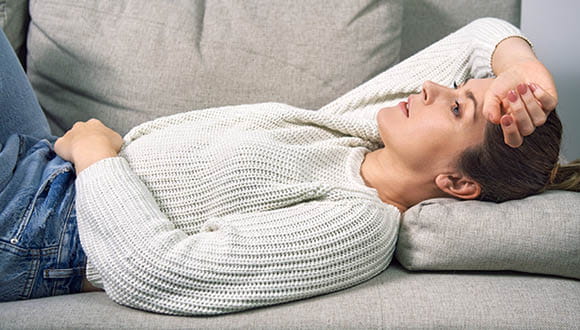Can Anxiety Cause Nausea? (& 5 More Questions About How Anxiety Might Feel)
May 26, 2021 - Katie McCallumYou're likely familiar with the emotional manifestations of anxiety:
- Nervousness
- Worrying
- Difficulty focusing
- Avoidance
But anxiety comes with physical symptoms, too. We have our fight-or-flight response to thank for this.
In the face of danger, whether real or perceived, your body reacts via the fight-or-flight response — revving up your autonomic nervous system, which controls respiration, heart rate, digestion and several other important bodily functions.
Everyone feels anxiety slightly differently, though.
For instance, maybe your muscles tighten and you feel like you're trembling. Or perhaps the first thing you notice is the butterflies — a sign that your heart rate is on the rise. Or maybe your body goes straight into emotional sweating mode.
Given the various potential physical symptoms of anxiety, how do you know if what you're feeling is truly anxiety or something else?
Can anxiety cause nausea?
Yes, anxiety can cause nausea and other gastrointestinal problems.
Outside of your brain, your digestive system contains the second largest number of nerves in your body. Some scientists even call your gut your "second brain."
It's no surprise then that the hormones and chemicals released when you're anxious can cause gut-related issues, including:
- Nausea
- Stomach cramps
- Loss of appetite
- Diarrhea or constipation
- Indigestion
Can anxiety cause chest pain?
Certain anxiety disorders can cause feelings of chest pain.
Chest pain is not a common symptom of the general anxiety you feel here and there.
However, if you suffer from a type of anxiety disorder called panic disorder, you may experience feelings of chest pain during a panic attack.
The most important consideration any time you're experiencing chest pain is the possibility of heart attack, which is a medical emergency.
Unfortunately, panic attack symptoms and heart attack symptoms can feel similar. So, whether you have a history of panic attacks or not, you should go to the emergency room if you're experiencing chest pain.
Can anxiety cause high blood pressure?
No, but it can cause a temporary spike in your blood pressure.
High blood pressure, also called hypertension, is a condition in which your blood pressure is chronically higher than it should be. This places extra force on the walls of your blood vessels and, over time, can lead to several health conditions, including:
- Heart attack
- Heart failure
- Stroke
- Aneurysm
- Metabolic disease
General anxiety can cause a temporary, significant increase in your blood pressure, but the effects typically don't linger long enough to have a lasting impact on your health or cause long-term high blood pressure.
However, if you regularly experience blood pressure spikes due to chronic anxiety issues, your blood vessels can be affected in ways similar to high blood pressure.
Can anxiety cause dizziness?
Anxiety disorders may be associated with dizziness.
People with anxiety disorders, particularly those with panic disorder, often complain of feeling dizzy or lightheaded.
However, the link between dizziness and anxiety isn't completely clear.
It's thought, though, that stress-related hormones or compounds released during the fight-or-flight response might affect the vestibular system within the inner ear, which coordinates balance and movement. This, in turn, may be the source of feelings of dizziness or lightheadedness in some individuals with anxiety disorders.
Can anxiety cause shortness of breath?
Certain anxiety disorders can cause feelings of shortness of breath.
General anxiety increases your respiration rate, causing you to breathe more rapidly than usual. This faster breathing, also called hyperventilation, isn't the same as shortness of breath, however.
Shortness of breath feels like a tightening in your chest and often comes with trouble breathing. It's not a common symptom of general anxiety.
However, similar to feelings of chest pain, shortness of breath is associated with panic attacks and panic disorder, a specific type of anxiety disorder.
Since it can be a sign of heart attack or another life-threatening condition, unexplained shortness of breath is a medical emergency. Whether you have a history of panic attacks or not, you should go to the emergency room if you're experiencing sudden and/or severe shortness of breath.
Can anxiety cause headaches?
Headaches are associated with chronic anxiety.
Headaches are common in and of themselves, but they aren't necessarily a common symptom of the general anxiety you might feel here and there.
However, headaches — including migraines — can be a complication of anxiety disorders, including generalized anxiety disorder (GAD). This type of anxiety disorder is characterized by persistent, excessive worrying that disrupts a person's day-to-day life.
The concerning symptoms of anxiety and the anxiety loop
When stress hits and your heart rate increases, your breathing quickens or you start trembling, it can be alarming. So alarming that, in some cases, you might even feel anxiety about your anxiety symptoms. This can lead to a worsening of the anxiety you're already feeling.
When anxiety hits, try to calm yourself with these tips:
- Take deep, controlled breaths
- Close your eyes and try to clear your mind
- Release tension from your body by relaxing
- Accept your anxiety, challenge the validity of your concern and try to shift your focus
If your symptoms become severe, including chest pain and/or shortness of breath, seek immediate medical attention at an emergency room — even if you think it's related to anxiety.
And, if you're experiencing general anxiety more frequently than usual, consider talking to your doctor or finding a mental health provider — especially if it's disrupting your day-to-day life. He or she can help you understand why anxiety happens and what to do about it.








